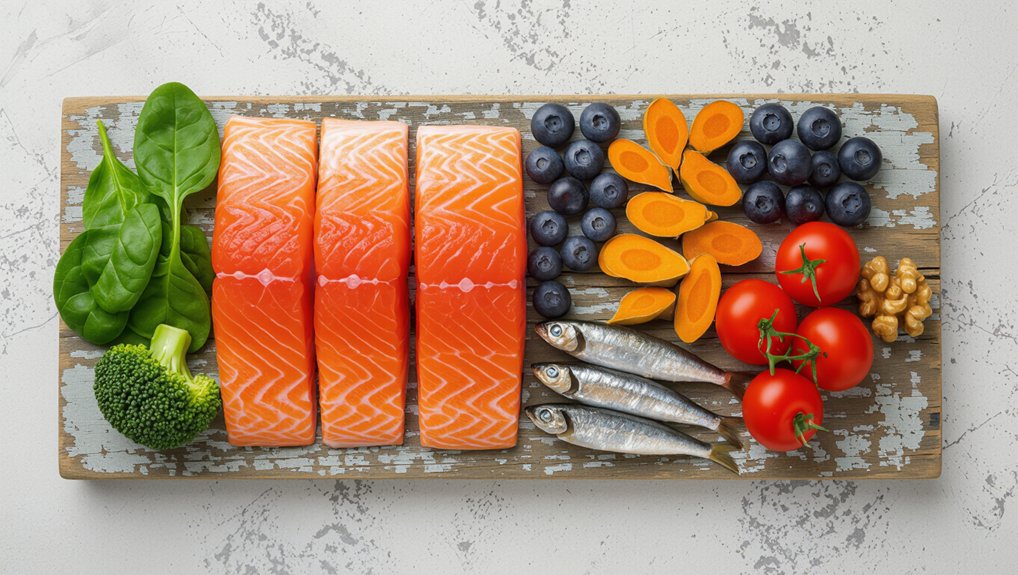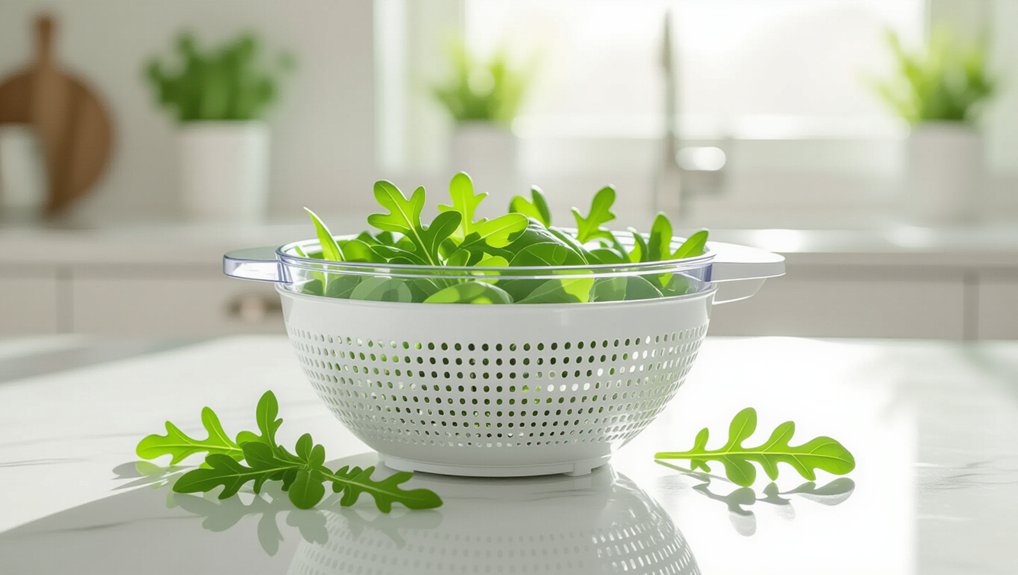You’ve probably heard that certain foods can help you live longer, but understanding which ones truly combat inflammation at the cellular level makes all the difference. While most people focus on what they should avoid, the real power lies in strategically choosing foods that actively fight the aging process from within. These specific anti-inflammatory champions don’t just taste good—they’re working behind the scenes to transform your health in ways you haven’t considered.
Fatty Fish: Omega-3 Powerhouses for Cellular Protection
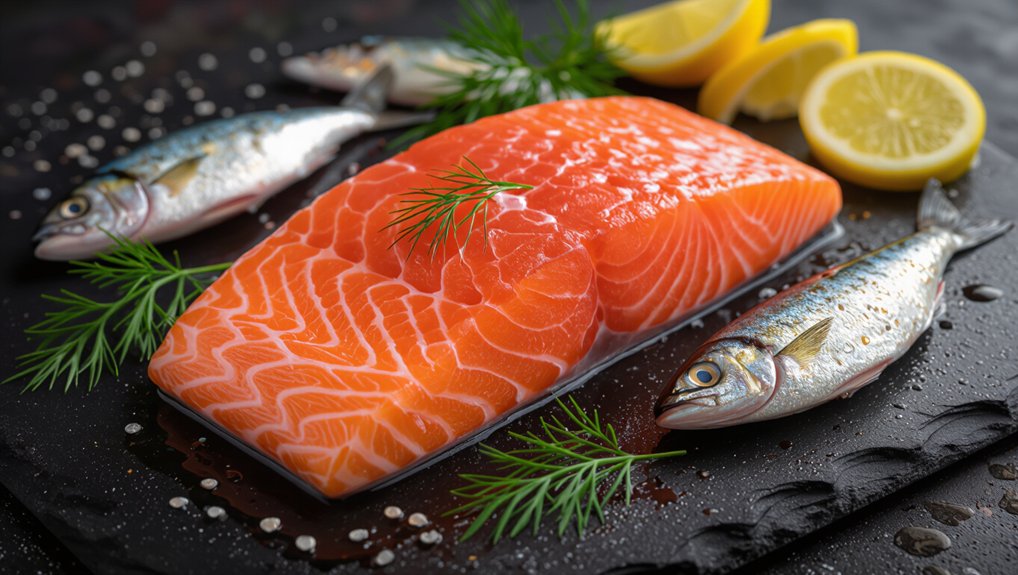
Your dinner plate can become a powerful weapon against chronic inflammation when you include fatty fish like salmon, mackerel, sardines, and anchovies. These omega-3 rich options deliver EPA and DHA directly to your cells, where they actively suppress inflammatory pathways that accelerate aging.
You’ll maximize benefits by consuming fatty fish twice weekly. Wild-caught varieties contain higher omega-3 concentrations than farm-raised alternatives. Salmon provides approximately 1,500mg of omega-3s per 3.5-ounce serving, while sardines pack similar amounts in smaller portions.
These essential fatty acids strengthen cellular membranes, reduce oxidative stress, and lower inflammatory markers like C-reactive protein. They’re particularly effective at protecting your cardiovascular system and brain function as you age.
Grilling, baking, or poaching preserves omega-3 content better than frying.
Leafy Greens: Nature’s Antioxidant Shields
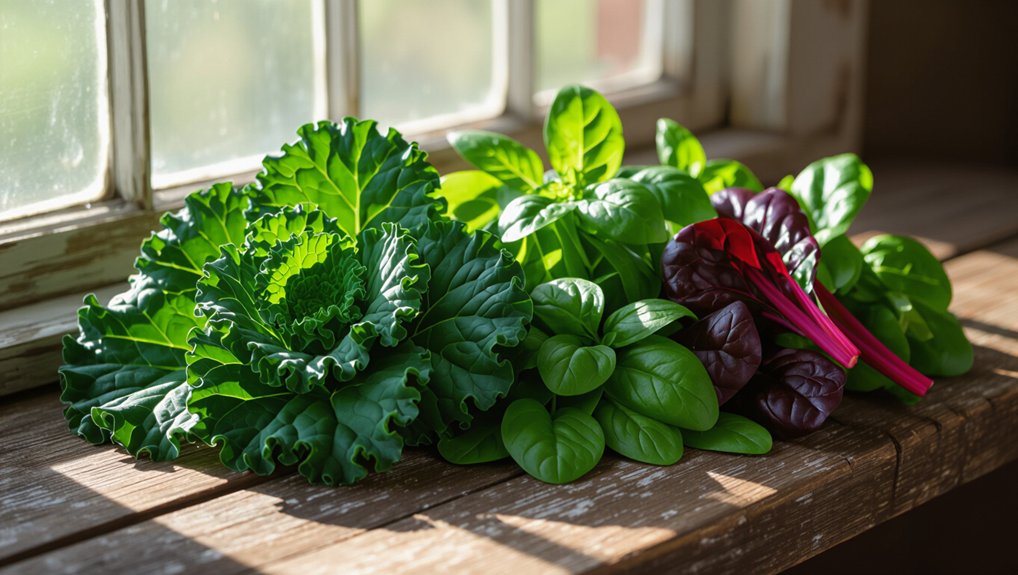
When you fill half your plate with dark leafy greens like spinach, kale, arugula, and Swiss chard, you’re loading your body with potent antioxidants that neutralize inflammation at the cellular level.
These vegetables contain high concentrations of vitamins A, C, and K, plus folate and lutein—compounds that combat oxidative stress and protect your DNA from damage.
You’ll benefit most from eating these greens raw or lightly steamed to preserve their nutrient density.
Kale provides sulforaphane, which activates your body’s detoxification pathways. Spinach delivers nitrates that improve blood flow and reduce arterial inflammation.
Swiss chard offers betalains, unique pigments that decrease inflammatory markers in your bloodstream. Arugula contains glucosinolates that support liver function and cellular repair mechanisms essential for healthy aging.
Berries: Anthocyanin-Rich Warriors Against Aging
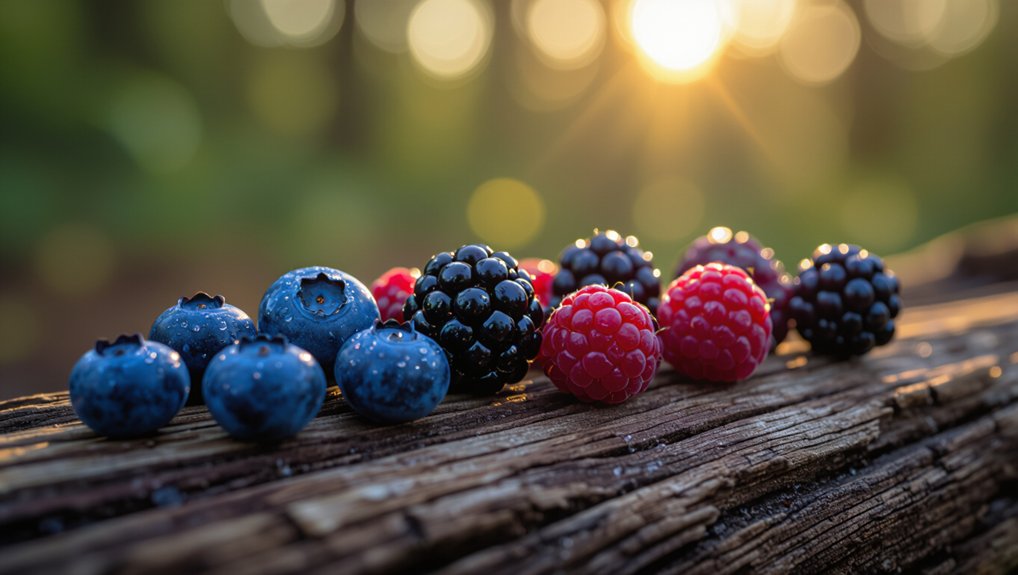
Berries pack more anti-aging power per bite than almost any other food group, delivering concentrated doses of anthocyanins—the vibrant pigments that give blueberries, blackberries, raspberries, and strawberries their deep colors.
These compounds don’t just create visual appeal; they’re potent inflammation fighters that protect your cells from oxidative damage.
You’ll find blueberries leading the charge with the highest anthocyanin content, followed closely by blackberries and elderberries. Research shows these compounds cross your blood-brain barrier, directly protecting cognitive function and memory.
They also support cardiovascular health by reducing arterial inflammation and improving blood flow.
Frozen berries retain their nutritional punch, making them accessible year-round. Add them to smoothies, yogurt, or eat them fresh.
Aim for half a cup daily to harness their longevity-boosting benefits.
Turmeric: The Golden Spice of Longevity
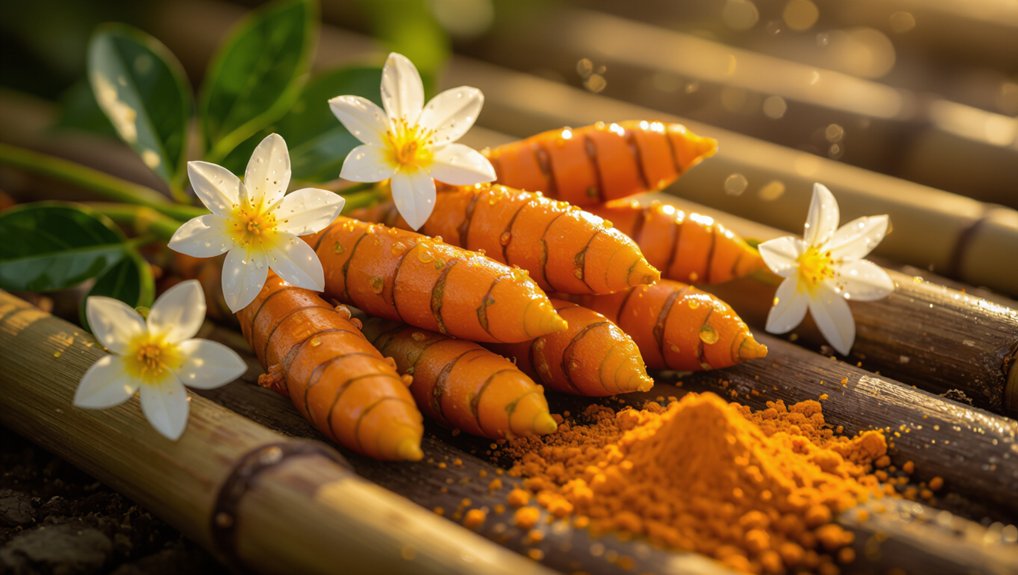
Turmeric’s brilliant orange-yellow hue signals the presence of curcumin, one of nature’s most powerful anti-inflammatory compounds. You’ll find this golden spice actively reduces chronic inflammation linked to heart disease, arthritis, and cognitive decline.
Curcumin works by inhibiting inflammatory pathways at the cellular level, potentially slowing aging processes. You can maximize turmeric’s benefits by pairing it with black pepper, which contains piperine that increases curcumin absorption by 2,000%.
Add turmeric to curries, smoothies, or golden milk lattes. Fresh turmeric root offers the highest potency, though ground turmeric works well too.
Studies show regular turmeric consumption may improve joint mobility, support brain health, and enhance immune function. You’re investing in long-term wellness when you incorporate this ancient healing spice into your daily routine.
Extra Virgin Olive Oil: Mediterranean Medicine in Every Drop
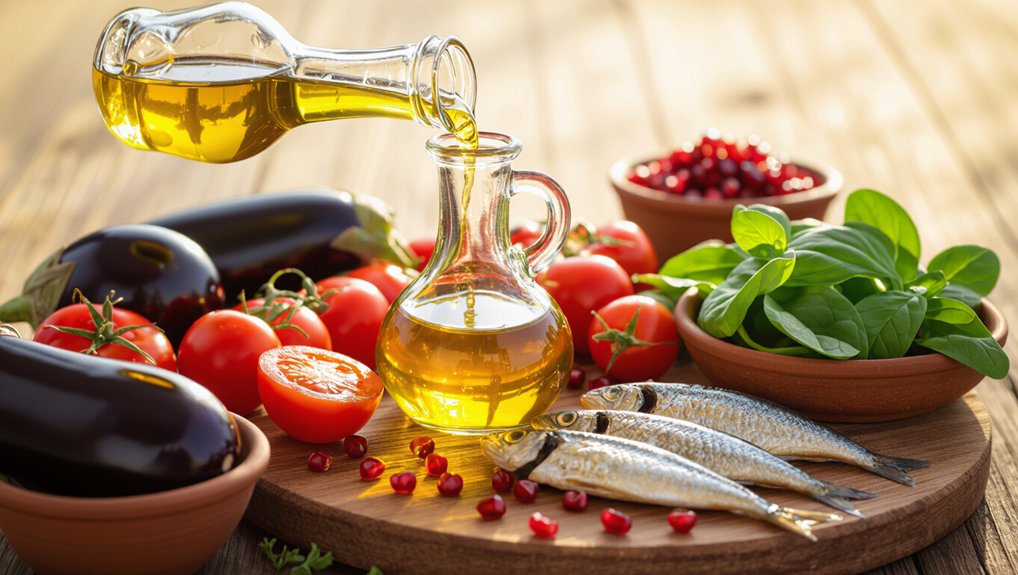
While turmeric offers concentrated anti-inflammatory power in small doses, extra virgin olive oil provides broader therapeutic benefits you can incorporate abundantly throughout your day.
You’ll find oleocanthal, a natural compound that mimics ibuprofen’s anti-inflammatory effects, in every tablespoon. This phenolic compound reduces chronic inflammation markers and supports cardiovascular health.
Choose cold-pressed varieties to preserve maximum nutrients. You can drizzle it over salads, use it for low-heat cooking, or take a tablespoon daily.
The monounsaturated fats enhance nutrient absorption from other foods while delivering antioxidants like vitamin E and polyphenols.
Mediterranean populations consuming high amounts show reduced rates of heart disease, cognitive decline, and inflammatory conditions.
You’re not just adding flavor—you’re incorporating medicine that’s sustained human health for millennia.
Nuts and Seeds: Healthy Fats for Inflammatory Balance
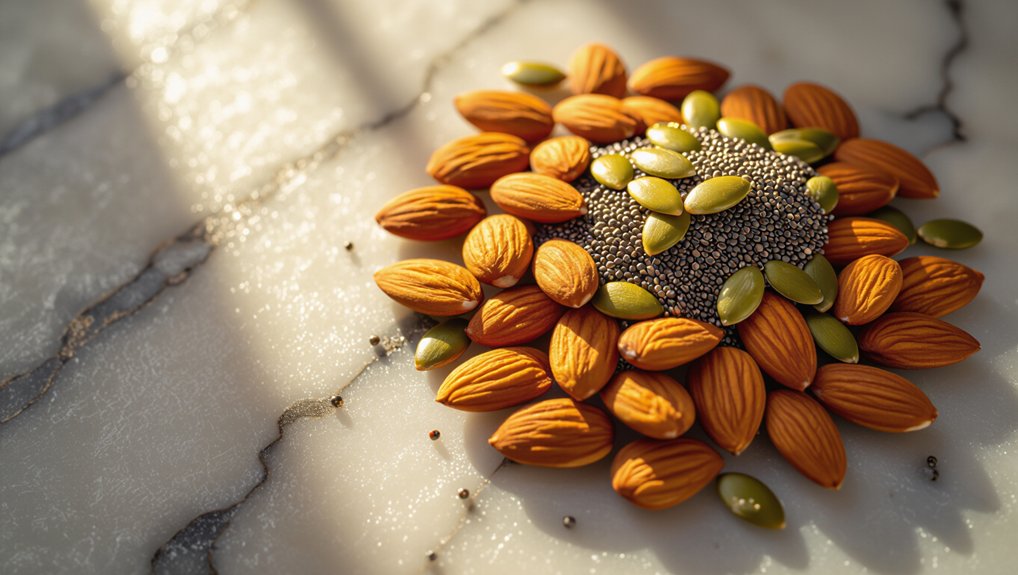
Beyond liquid sources of healthy fats, nuts and seeds deliver concentrated anti-inflammatory compounds in convenient, portable packages.
You’ll find omega-3 fatty acids in walnuts, while almonds provide vitamin E that protects your cells from oxidative stress. Brazil nuts contain selenium, a mineral that supports your body’s antioxidant defenses.
Seeds pack similar benefits into smaller packages. You’ll get alpha-linolenic acid from flaxseeds and chia seeds, both converting to anti-inflammatory EPA and DHA in your body.
Pumpkin seeds offer zinc and magnesium for immune function.
Don’t overconsume these calorie-dense foods. A small handful daily provides optimal benefits without excess calories.
Choose raw or dry-roasted varieties over salted or sugar-coated options. Mix different types throughout your week to maximize diverse anti-inflammatory compounds.
Tomatoes: Lycopene’s Role in Fighting Oxidative Stress
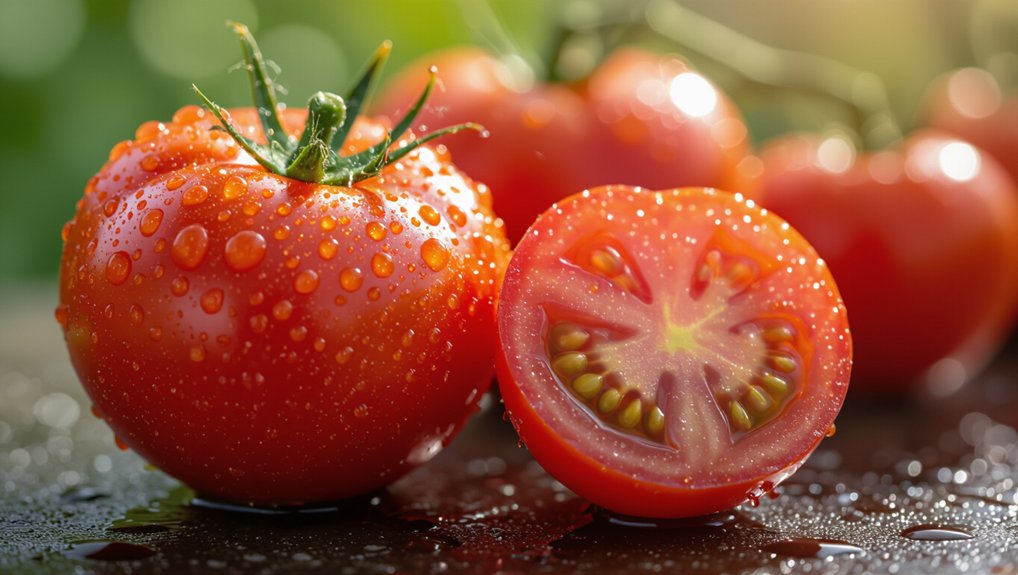
Moving from concentrated sources of healthy fats, you’ll find powerful anti-inflammatory compounds in colorful vegetables like tomatoes. Lycopene, the carotenoid responsible for tomatoes’ vibrant red color, acts as a potent antioxidant that neutralizes harmful free radicals in your body.
When you consume lycopene regularly, you’re protecting your cells from oxidative damage that contributes to chronic inflammation and accelerated aging. Research shows lycopene reduces inflammatory markers like C-reactive protein and interleukin-6, both linked to cardiovascular disease and age-related decline.
You’ll maximize lycopene absorption by eating cooked tomatoes with healthy fats. Try sautéing tomatoes in olive oil, adding them to pasta sauces, or enjoying tomato-based soups.
Heat breaks down cell walls, making lycopene more bioavailable than raw preparations.
Green Tea: Polyphenol Protection in Every Sip
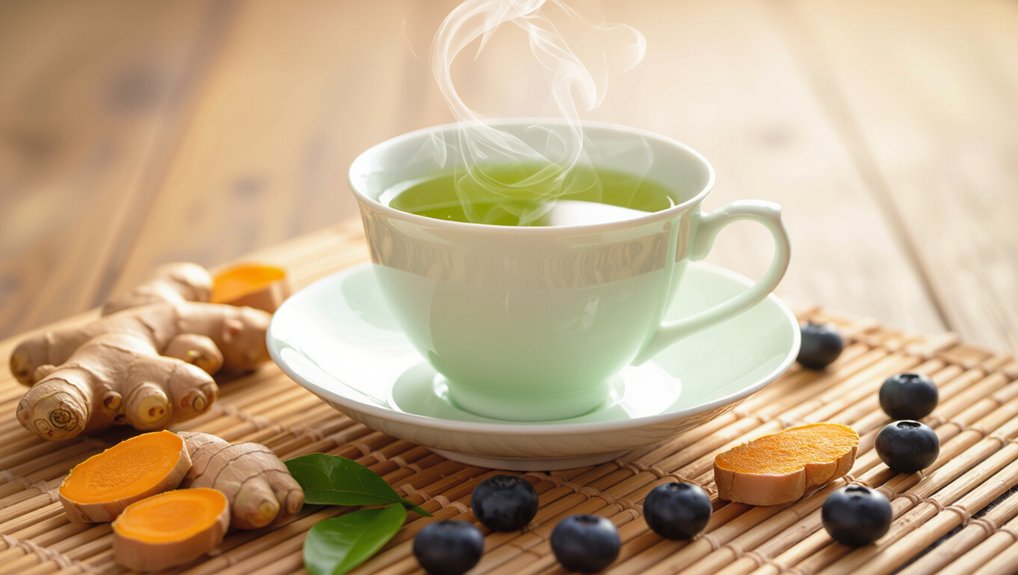
How can a simple beverage deliver such concentrated anti-inflammatory power? Green tea’s secret lies in its abundant polyphenols, particularly epigallocatechin gallate (EGCG).
When you sip green tea regularly, you’re flooding your system with these potent compounds that actively suppress inflammatory pathways in your body.
EGCG targets specific enzymes responsible for producing inflammatory molecules, effectively reducing chronic inflammation at the cellular level.
Studies show that drinking 2-3 cups daily can lower C-reactive protein levels—a key inflammation marker linked to heart disease and accelerated aging.
You’ll maximize green tea’s benefits by steeping it for 3-5 minutes in water heated to 175°F. This temperature extracts optimal polyphenol levels without releasing bitter tannins.
Choose organic varieties when possible, and drink it between meals to enhance absorption of these life-extending compounds.
Cruciferous Vegetables: Sulfur Compounds for Cellular Defense
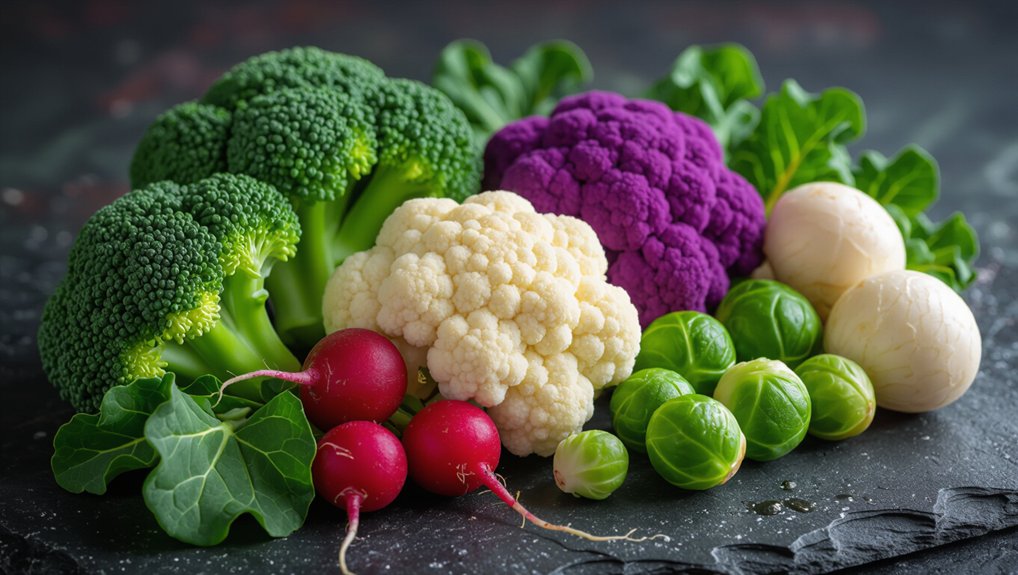
Broccoli, cauliflower, and Brussels sprouts might seem like ordinary vegetables, but they’re actually powerhouses packed with sulfur-containing compounds called glucosinolates.
When you chew these cruciferous vegetables, you activate an enzyme that converts glucosinolates into sulforaphane, a potent anti-inflammatory molecule.
Sulforaphane targets your body’s cellular defense systems by activating Nrf2 pathways, which boost your natural antioxidant production. This process helps neutralize free radicals and reduces chronic inflammation linked to aging and disease.
You’ll get maximum benefits by eating these vegetables raw or lightly steamed, as overcooking destroys the beneficial enzymes.
Add kale, cabbage, and watercress to your rotation for variety.
These vegetables don’t just fight inflammation—they support detoxification pathways that help your cells repair and regenerate more efficiently.
Avocados: Monounsaturated Fats for Whole-Body Wellness
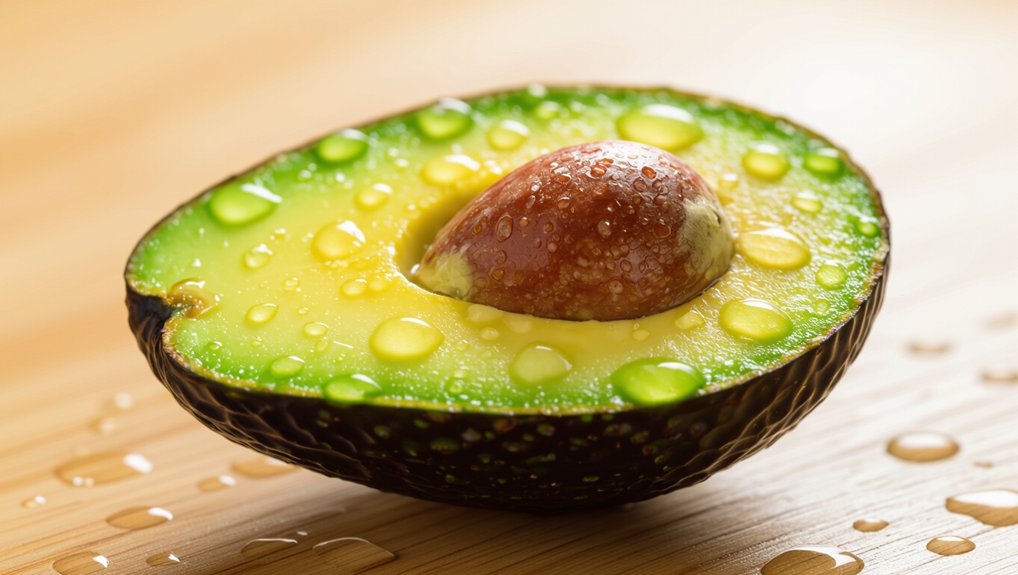
The creamy richness of avocados delivers far more than satisfying taste—it provides your body with oleic acid, a monounsaturated fat that actively reduces inflammatory markers throughout your system. This powerful compound strengthens your cardiovascular health by lowering LDL cholesterol while maintaining beneficial HDL levels.
You’ll also benefit from avocados’ high potassium content, which regulates blood pressure and supports heart function.
Beyond cardiovascular protection, avocados enhance nutrient absorption from other foods. Their healthy fats help your body absorb fat-soluble vitamins A, D, E, and K more effectively.
The fruit’s fiber content promotes digestive health and helps stabilize blood sugar levels. Regular avocado consumption supports brain function, reduces oxidative stress, and may help prevent age-related cognitive decline through improved vascular health.
Conclusion
You’ve now discovered nature’s most powerful anti-inflammatory arsenal for extending your healthspan. By incorporating these nutrient-dense foods into your daily routine, you’re actively combating cellular damage and reducing chronic inflammation. Don’t wait to start this transformation—your future self will thank you for every omega-3-rich meal, every antioxidant-packed berry, and every turmeric-spiced dish you enjoy today. Your longevity journey begins with your next grocery list.
